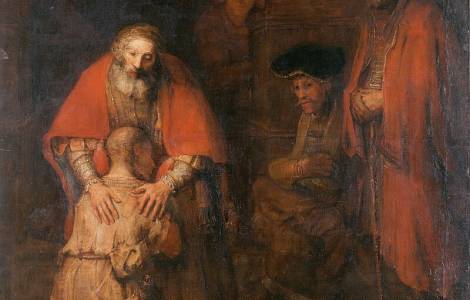
Vatican City (Agenzia Fides) - After meditating on Jesus' encounters with some figures from the Gospels, Pope Francis, continuing the cycle of catechesis dedicated to the life of Christ read in the light of the themes of the Holy Year, begins a new chapter, dedicated to the parables of Jesus. They are "stories that draw on images and situations from everyday reality", explains the Pontiff in the text released only in written form for the General Audience that he was supposed to hold today, and "that is why they also touch our lives. They provoke us. And they ask us to take a position: where am I in this story?".
The Pope then analyzes what he himself defines as "the most famous parable, the one that perhaps we all remember", that of the prodigal son: "In this we find the heart of the Gospel of Jesus, namely God’s mercy".
The evangelist Luke, explains the Pope, "says that Jesus tells this parable for the pharisees and the scribes, who lamented that He ate with sinners. This is why it could be said that it is a parable addressed to those who are lost, but do not know it, and judge others. The Gospel is intended to give us a message of hope, because it tells us that wherever we are lost, and however we are lost, God always comes looking for us!".
The Pope invites us to reflect on the behavior of the two sons. Indeed, both have lost their way: "the youngest because he got tired of being in a relationship that he felt was too demanding; but the eldest is also lost, because it is not enough to stay at home if there is pride and resentment in his heart".
"Love," the Bishop of Rome points out, "is always a commitment, there is always something that we must lose in order to go towards the other. But the younger son in the parable thinks only of himself. Like all of us, hungers for affection, he wants to be loved. But love is a precious gift; it must be treated with care. Instead, he squanders it, he disregards it, he does not respect himself. He realizes this in times of famine, when no-one cares for him. The risk is that in those moments we beg for affection and attach ourselves to the first master we chance upon.".
It is these experiences, adds the Pope, " that give rise within us to the distorted belief that we can only be in a relationship as servants, as if we had to atone for a guilt or as if true love could not exist". And indeed "the younger son, when he hits rock bottom, thinks he will go back to his father’s house to pick up a few crumbs of affection from the ground".
In reality, the Pontiff emphasizes, "only those who truly love us can free us from this false view of love." He then cites a work by Rembrandt, who in depicting the young man's return home, depicts "the young man’s head is shaven, like that of a penitent, but it also looks like the head of a child, because this son is being born again. And then the father’s hands: one male and the other female, to describe the strength and tenderness in the embrace of forgiveness."
But it is the eldest son, the Bishop of Rome points out, "who represents those for whom the parable is told: he is the son who always stayed at home with his father, yet was distant from him, distant in heart. This son may have wanted to leave too, but out of fear or duty he stayed there, in that relationship. When you adapt unwillingly, however, you begin to harbour anger within you, and sooner or later this anger explodes. Paradoxically, it is precisely the eldest son who in the end risks being left out, because he does not share his father’s joy." And the father "goes towards him too. He does not reproach him or call him to duty. He wants only that he feels his love. He invites him to enter and to leave the door open".
"That door remains open for us too. Indeed, this is the reason for hope: we are able to hope because we know that the Father is waiting for us, He sees us from afar, and He always leaves the door open", concludes the Pope. (F.B.) (Agenzia Fides, 16/4/2025)